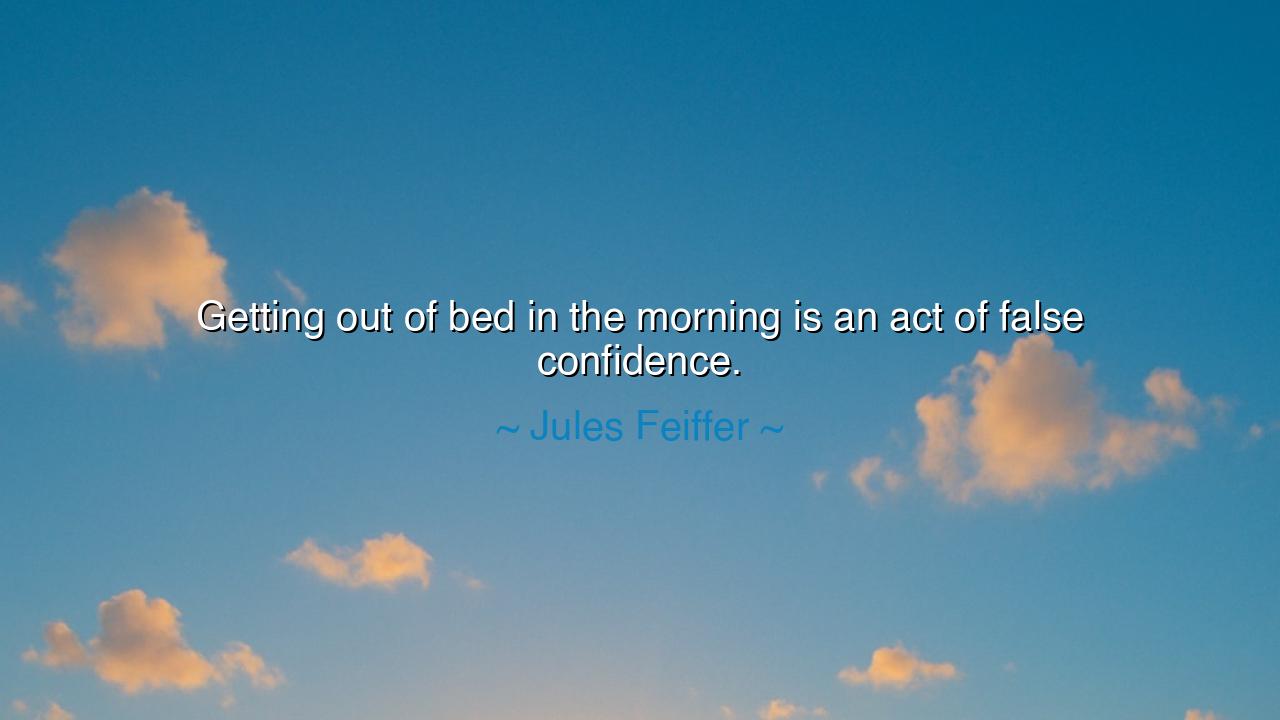
Getting out of bed in the morning is an act of false confidence.






In the quiet darkness before the dawn, when the body still lingers in the comfort of sleep, there lies a profound truth that few dare to face. Jules Feiffer, a man whose words often cut to the heart of human experience, once said, "Getting out of bed in the morning is an act of false confidence." These words speak to the very nature of human existence—our struggle with uncertainty, our fear of the unknown, and the fragile nature of confidence that we wear like a shield, even in the face of a world that often feels daunting and unpredictable. Feiffer’s statement reveals the deep, unspoken truth that rising each day requires an act of will, a false belief in our ability to face the challenges ahead.
In the ancient world, this same tension between confidence and uncertainty was understood by the greatest of warriors and philosophers. The Greek hero Odysseus, in his journey back home, was often forced to act despite the immense uncertainty and fear that gripped him. Each morning, he would rise, facing not only the challenges of the gods but the deep uncertainty of his fate. Yet, he had no choice but to continue—every action he took was a demonstration of courage born from false confidence, a belief in his own abilities that allowed him to face the unknown without retreat. Feiffer’s words echo this ancient dilemma: the act of rising each day, of moving forward despite our doubts, is an act of courage, even if that courage feels fragile.
The false confidence Feiffer speaks of is not a falsehood born of delusion, but of necessity. In the lives of the ancients, warriors and leaders understood that facing a new day often required a momentary belief in one’s own strength, even if that belief was fleeting. Alexander the Great, for example, faced battles that seemed insurmountable, yet each day he rose to meet them with a sense of purpose and self-assurance. He did not know if victory would be his, but he knew that the act of rising and continuing was essential to his destiny. Feiffer’s insight into the fragility of confidence mirrors this ancient truth: sometimes we must rise without knowing the outcome, without certainty, but driven by the belief that we must act anyway.
This idea of “false confidence” is also deeply tied to the human condition—the struggle to find meaning and purpose in a world that is often unpredictable and chaotic. The Roman Stoics, such as Marcus Aurelius and Seneca, understood the importance of facing life’s challenges without the illusion of certainty. They believed that we could not control the world around us, but we could control how we responded to it. Feiffer’s quote speaks to the human experience of rising each day and facing life’s unpredictable nature—and yet, even in the face of doubt and fear, we must act. For stoicism teaches that it is in the act of rising and moving forward that we find our strength, not in the certainty of the outcome.
Consider the story of Socrates, the great philosopher who, despite his recognition of life’s uncertainties, continued to engage in the pursuit of wisdom. His daily practice of questioning, challenging assumptions, and seeking truth was not an act of assured success but of ongoing effort in the face of doubt. Socrates, in his courage to face each day’s uncertainties, exemplified Feiffer’s notion of "false confidence"—a belief in the importance of action despite the lack of guarantees. The act of rising each day, for Socrates, was not an admission of certainty, but of the belief that each day’s pursuit of wisdom mattered, even if the outcome was unknown.
The lesson here, then, is one of courage in the face of the unknown. To rise each day is to engage in a profound act of will, one that requires confidence, but a confidence that is not always rooted in certainty. Feiffer’s words remind us that even in the face of doubt, we must continue to rise, to act, and to face the challenges before us with purpose and resolve. Just as the great warriors of old knew that the fight was not always certain, but the act of fighting was what mattered, so too must we approach our daily lives with the understanding that our strength lies not in knowing the outcome, but in the act of rising despite our uncertainty.
So, let us take this lesson to heart in our own lives. In the face of doubt, in the quiet uncertainty of the morning, we must choose to rise. We must choose to move forward, knowing that even if our confidence feels false, it is still the act of courage that will carry us through the day. Let us embrace the struggle, knowing that it is in the act of rising that we define our strength and our character. For, in the end, it is not the certainty of the outcome that defines us, but the act of continuing, of rising each day, that reveals the true depth of our spirit.






AAdministratorAdministrator
Welcome, honored guests. Please leave a comment, we will respond soon